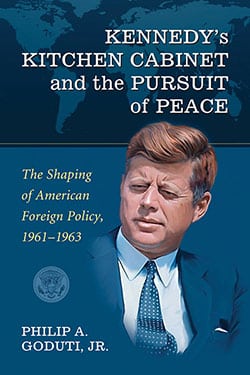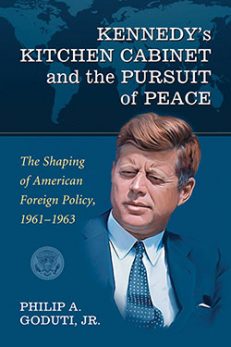Subtotal: $19.99
Kennedy’s Kitchen Cabinet and the Pursuit of Peace
The Shaping of American Foreign Policy, 1961–1963
$39.95
In stock
About the Book
John F. Kennedy’s advisors were enormously influential in the shaping of American foreign policy at a crucial time. After struggling in his first year as president, Kennedy employed the guidance of a core group including McGeorge Bundy, Robert Kennedy, Robert McNamara, Maxwell Taylor and Theodore Sorensen. This “kitchen cabinet” led to strong leadership in confronting serious challenges arising from the Soviet Union, Cuba, Southeast Asia and Berlin.
About the Author(s)
Bibliographic Details
Philip A. Goduti, Jr.
Format: softcover (6 x 9)
Pages: 249
Bibliographic Info: notes, bibliography, index
Copyright Date: 2009
pISBN: 978-0-7864-4020-7
eISBN: 978-0-7864-5455-6
Imprint: McFarland
Table of Contents
Acknowledgments vii
Preface 1
Introduction 5
Part One. The First One Hundred Days: Crafting Foreign Policy in the Kennedy White House
1. The Over-Cautious Approach 12
2. Germany and Cuba 26
Part Two. Mission to Vienna: The Preparation of the Commander in Chief and the Impact of a Summit
3. The Art of Diplomacy 40
4. “A very sober two days” 54
Part Three. “Once more unto the breach”: Constructing the Wall Between America and the Soviets
5. The Vienna Effect 70
6. “Perhaps a wall” 85
Part Four. Brother’s Keeper: Robert F. Kennedy’s Role in Presidential Decision-making
7. Jack and Bobby 106
8. RFK and the CIA 119
Part Five. “Dogs of War”: McNamara, the Joint Chiefs and the American Military Complex
9. Whiz Kid and War Hero 132
10. The Joint Chiefs of Staff 145
Part Six. Waiting for the Enemy to Blink: Perspectives on the Cuban Missile Crisis
11. Preparing for a Storm 158
12. Brinkmanship in the Kennedy White House 176
Part Seven. “No man is an island, entire of itself ”: Leading to Peace and Cooperation
13. “A Strategy of Peace” 198
14. “Ich bin ein Berliner” 212
Epilogue 223
Chapter Notes 225
Bibliography 235
Index 237

 The Age of Dimes and Pulps
The Age of Dimes and Pulps 




